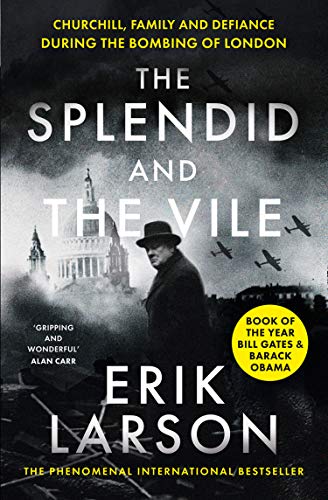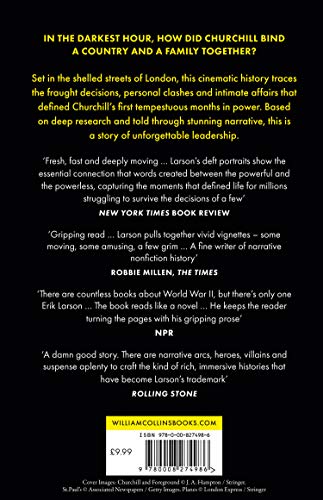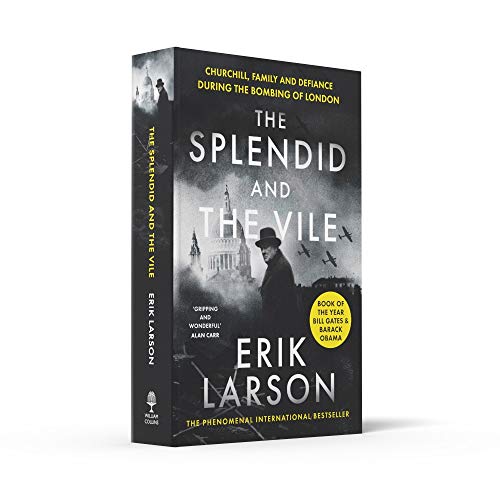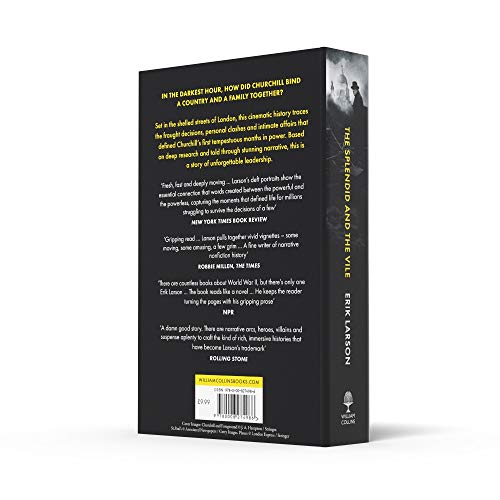معلومات عنا
دعم العملاء
احصل على التطبيق

قم بتوجيه الكاميرا لتنزيل التطبيق
حقوق الطبع والنشر © 2024 Desertcart Holdings Limited





The Splendid and the Vile: Churchill, Family and Defiance During the Bombing of London
K**I
Churchill’s leadership!
A quick read. Nice glimpse into the times when Churchill came into power & how he handled leadership responsibilities in a difficult time for England.
R**N
A superb account
The Splendid and the Vile by Erik LarsonThis book focuses on the dramatic events between the arrival of Winston Churchill as Prime Minister in May 1940 to the entry into the war of the United States in December 1941. The narrative moves effortlessly between the high drama of the war and the intimacies of Churchill’s family and the contrast between terrible events and the concerns of everyday life, not least the universal pleasures of romance in the beautiful summer of 1940, much of it told through the observations of Churchill’s youngest daughter Mary and one of his private assistants John Colville. This is very much the world of upper class English life but wider social comments come through reports from the Mass Observation correspondents.Churchill is introduced as an enigmatic figure divisive and unreliable to many political contemporaries but adored by much of the public who believe he is the only man to lead the country out of the dire straits apparent by May 1940. A striking part of the ensuing narrative is how Churchill becomes increasingly respected and even loved by those who work closely with him. He is described with all his eccentricity and unreasonableness but also his warm humanity. The unremitting pressure on him is all too obvious and although prone to dangerous diversions and an enthusiasm for any form of action his strategic sense is a dominating theme. Right from the beginning he sees Nazism as evil and not a force to negotiate with, he sees the absolute need to win the USA to the cause and he understands the power of image and oratory to stiffen morale and see the country through the dangerous months of the Battle of Britain and the Blitz. The range of his concerns, his work load and amazing energy are quite remarkable. There are wonderful pen portraits of Beaverbrook, Ismay, Lindemann, Goring and Harry Hopkins but also the sadness of aspects of Churchill’s family life particularly the increasingly tragic figure of his son Randolph. The main themes are peppered with little vignettes such as the importance of tea for civilian life, the accounts for running Chartwell, the significance of radar, and the ceaseless round of Churchill’s purposeful entertaining.The author manages to bring to life a familiar period of British history with the skill of a novelist and an immediacy to events that take the reader to the heart of the personal and national drama. At the end this reader, at least, was reminded how fortunate civilisation was to have such a champion as Winston Churchill at its moment of greatest danger.
A**S
What’s Well-Known becomes New When Retold as Personal Saga
There are few historical episodes more well known to Anglophones than the Battle of Britain. Even the words Churchill used to help save democratic civilization have become cliches: “Their finest hour”, “Blood, sweat and tears”, “Never have so many owed so much to so few.”Given that libraries could be filled with volumes dissecting almost every angle of Churchill’s life and WWII, it’s hard to imagine that Erik Larson could offer anything particularly original.He has chosen, however, not to emphasize the extensive scholarship on this era, but to use journals and other primary sources to retell the Battle of Britain as it appeared to those in Churchill’s immediate circle. Thus, we get details as various as teenage Mary Churchill’s love of dances juxtaposed with his pet scientist’s ability to explain radar technology in a way he could understand.These personal portraits, drawn from contemporary sources, combine to form a unique saga of what it felt like to be around Churchill in this troubled era. Accomplished with real brilliance, I thoroughly enjoyed Larson’s narrative.Personal taste for this kind of history will, obviously, differ. Should history be recounted with more ample reference to other scholars? Does the personal inform the world-historical as much as Larson suggests?These are questions which ultimately have to be answered by every reader. But, to my taste, this technique was an immense success in shedding new light on this dark, but inspiring era, in human history.
W**L
A competent undergraduate piece, but not a lot more.
Not sure who this is aimed at. £20 for a book whose contents are little more than magazine filler. It's well written, as you would expect from a writer of successful crime thrillers but it is a scissors and paste job - all the material in the book has been done before (spookily familiar) and we read nothing new. It is one of those books which, if the author was not already known, the manuscript would have received a polite rejection slip. If you know nothing about Churchill and WW2 and are about 12 years old, this book is possibly for you. Otherwise, save your money. Academic rigour and analysis; not on this occasion.
D**G
History written like a fictional thriller
I've read a few biographical texts about Churchill, and this one surpassed all of them in achieving a balance of factual accuracy, readability, brevity and human interest. It read very much like a work of fiction, except that the author had extensively researched the history underlying this period in WWII and, as far as I know, everything happened exactly as described (even the detail of some conversations is documented in the annotations at the end).It not only covered the major events of this period, but also the day-to-day details of the lives of many of the minor characters in Churchill's family, government, the military, and on the German side. The only very slightly off-putting aspect of the book was the American English spelling and vernacular. Churchill is a cherished part of British history, and I found it jarred whenever these (admittedly rare) instances cropped up. I don't know why I assumed that Erik Larson was British (his name seems Scandinavian, and he is in fact American) - perhaps I wrongly thought that an American audience would not be as interested in a book about such a quintessentially British character. Regardless, it didn't spoil my enjoyment of an excellent historical account of a critical figure and moment in British history.I intend to root out other books by this author, in the hope that they are equally as good as this one.
J**.
Both humorous and terrifying
This is a view of Churchill's first year as Prime Minister during World War 2, as sourced from the memoirs and diaries of those closest to him at the time.Casting him as a human being, this book is by turns hilarious and frightening. A warts-and-all view of the man, and his aides, gives a refreshingly realistic picture of how things were, without diminishing the amount of respect I have for all involved.
ترست بايلوت
منذ شهر
منذ يوم واحد